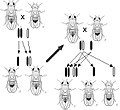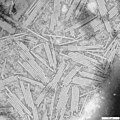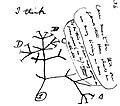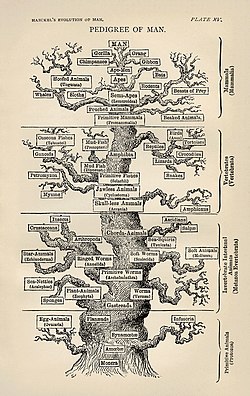Portal:Biology
Introduction


Biology is the scientific study of life and living organisms. It is a broad natural science that encompasses a wide range of fields and unifying principles that explain the structure, function, growth, origin, evolution, and distribution of life. Central to biology are five fundamental themes: the cell as the basic unit of life, genes and heredity as the basis of inheritance, evolution as the driver of biological diversity, energy transformation for sustaining life processes, and the maintenance of internal stability (homeostasis).
Biology examines life across multiple levels of organization, from molecules and cells to organisms, populations, and ecosystems. Subdisciplines include molecular biology, physiology, ecology, evolutionary biology, developmental biology, and systematics, among others. Each of these fields applies a range of methods to investigate biological phenomena, including observation, experimentation, and mathematical modeling. Modern biology is grounded in the theory of evolution by natural selection, first articulated by Charles Darwin, and in the molecular understanding of genes encoded in DNA. The discovery of the structure of DNA and advances in molecular genetics have transformed many areas of biology, leading to applications in medicine, agriculture, biotechnology, and environmental science.
Life on Earth is believed to have originated over 3.7 billion years ago. Today, it includes a vast diversity of organisms—from single-celled archaea and bacteria to complex multicellular plants, fungi, and animals. Biologists classify organisms based on shared characteristics and evolutionary relationships, using taxonomic and phylogenetic frameworks. These organisms interact with each other and with their environments in ecosystems, where they play roles in energy flow and nutrient cycling. As a constantly evolving field, biology incorporates new discoveries and technologies that enhance the understanding of life and its processes, while contributing to solutions for challenges such as disease, climate change, and biodiversity loss. (Full article...)
Selected article -
A virus is a submicroscopic infectious agent that replicates only inside the living cells of an organism. Viruses infect all life forms, from animals and plants to microorganisms, including bacteria and archaea. Viruses are found in almost every ecosystem on Earth and are the most numerous type of biological entity. Since Dmitri Ivanovsky's 1892 article describing a non-bacterial pathogen infecting tobacco plants and the discovery of the tobacco mosaic virus by Martinus Beijerinck in 1898, more than 16,000 of the millions of virus species have been described in detail. The study of viruses is known as virology, a subspeciality of microbiology.
When infected, a host cell is often forced to rapidly produce thousands of copies of the original virus. When not inside an infected cell or in the process of infecting a cell, viruses exist in the form of independent viral particles, or virions, consisting of (i) genetic material, i.e., long molecules of DNA or RNA that encode the structure of the proteins by which the virus acts; (ii) a protein coat, the capsid, which surrounds and protects the genetic material; and in some cases (iii) an outside envelope of lipids. The shapes of these virus particles range from simple helical and icosahedral forms to more complex structures. Most virus species have virions too small to be seen with an optical microscope and are one-hundredth the size of most bacteria. (Full article...)
Selected picture -

Major topics
Selected biography -
Ann Bishop (19 December 1899 – 7 May 1990) was a British biologist from Girton College at the University of Cambridge and a Fellow of the Royal Society, one of the few female Fellows of the Royal Society. She was born in Manchester but stayed at Cambridge for the vast majority of her professional life. Her specialties were protozoology and parasitology; early work with ciliate parasites, including the one responsible for blackhead disease in the domesticated turkey, lay the groundwork for her later research. While working towards her doctorate, Bishop studied parasitic amoebae and examined potential chemotherapies for the treatment of amoebic diseases including amoebic dysentery.
Her best known work was a comprehensive study of Plasmodium, the malaria parasite, and investigation of various chemotherapies for the disease. Later she studied drug resistance in this parasite, research that proved valuable to the British military in World War II. She discovered the potential for cross-resistance in these parasites during that same period. Bishop also discovered the protozoan Pseudotrichomonas keilini and worked with Aedes aegypti, a malaria vector, as part of her research on the disease. Elected to the Royal Society in 1959, Bishop was the founder of the British Society for Parasitology and served on the World Health Organization's Malaria Committee. (Full article...)
General images -
Did you know -
- ... that seeds of the fossil fruit Suciacarpa have fossil fungi inside them?
- ... that the fossil ant genus Agastomyrma was described from a single queen, and males of the fossil ant Proceratium eocenicum have a hair fringe?
- ... that less than 50 years after being discovered, Heterelmis stephani is now presumed extinct?
- ... that in 1981 Bobbi Campbell became the first person to publicly identify as a person living with HIV/AIDS?
Things you can do
Related portals
Biology portals
Categories

Anatomy - Anthropology - Astrobiology - Biochemistry - Bioengineering - Bioinformatics - Biotechnology - Botany - Cell biology - Conservation biology - Developmental biology - Ecology - Environmental science - Evolutionary biology - Genetics - Mathematical biology - Medicine - Microbiology - Immunology - Molecular biology - Mycology - Neuroscience - Paleontology - Palynology Parasitology - Pharmacology -
Phylogenetics - Physiology - Systems biology - Taxonomy - Toxicology - Virology - ZoologyMore topics
WikiProjects

WikiProjects connected with biology:
A complete list of scientific WikiProjects can be found here. See also Wikispecies, a Wikimedia project dedicated to classification of biological species.
Associated Wikimedia
The following Wikimedia Foundation sister projects provide more on this subject:
-
Commons
Free media repository -
Wikibooks
Free textbooks and manuals -
Wikidata
Free knowledge base -
Wikinews
Free-content news -
Wikiquote
Collection of quotations -
Wikisource
Free-content library -
Wikiversity
Free learning tools -
Wiktionary
Dictionary and thesaurus


























































